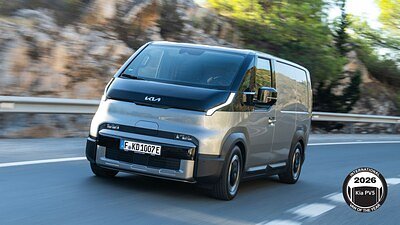
Kia Disrupts Van Market with Award-Winning Electric PV5 and Ambitious LCV Strategy
Kia’s all-electric PV5 van has claimed the prestigious International Van of the Year award, signaling a bold entry into the commercial vehicle sector and a commitment to sustainable mobility. The company is building a dedicated production hub and expanding its PBV lineup.
Kia Disrupts Van Market with Award-Winning Electric PV5 and Ambitious LCV Strategy
LYON, FRANCE – November 19, 2025 – Kia Europe has been awarded the coveted 2026 International Van of the Year (IVOTY) award for its all-electric PV5, marking a significant milestone for the South Korean automaker and a signal of its ambitions in the rapidly evolving light commercial vehicle (LCV) market. The award, presented today at SOLUTRANS in Lyon, France, recognizes the PV5’s innovative design, impressive range, and commitment to sustainable transport. This victory is particularly noteworthy as it represents Kia’s first-ever IVOTY win, breaking new ground for a Korean manufacturer in this competitive sector.
A New Contender Emerges
The IVOTY award is judged by a panel of leading commercial vehicle journalists from across Europe and South Africa. The PV5’s win underscores the growing acceptance of electric vans and the increasing competitiveness of new entrants into the market. “The jury was particularly impressed with the PV5’s combination of practicality, range, and technological innovation,” stated one jury member. The van also recently shattered a Guinness World Record, travelling an impressive 430.84 miles on a single charge with a full payload—demonstrating its real-world capabilities and challenging established perceptions of electric van performance. This record-breaking feat, verified by Guinness World Records, showcased the PV5’s efficiency and reliability under demanding conditions, surpassing the previous record by a considerable margin.
Beyond the Award: Kia’s Strategic Shift
Kia’s success with the PV5 is not merely a product launch; it is part of a larger, strategic shift into the LCV market, underpinned by the company’s “Platform Beyond Vehicle” (PBV) strategy. Unlike many automakers approaching electrification as a secondary consideration, Kia has built its PBV strategy into its core business plan. “We are not simply electrifying existing vans; we are designing purpose-built vehicles optimized for a range of commercial applications,” explained a company spokesperson. The manufacturer is investing heavily in dedicated production facilities, including the new Hwaseong EVO Plant in South Korea, to support its ambitious PBV roadmap. This plant, expected to reach a combined annual production capacity of 250,000 units, represents a substantial commitment to the LCV market. The EVO plant embodies a commitment to sustainability; it is designed with advanced manufacturing processes aiming to minimize its environmental footprint.
Navigating a Competitive Landscape
The European eLCV market is becoming increasingly crowded, with established players like Ford, Mercedes-Benz, and Volkswagen vying for market share. Ford’s E-Transit remains a dominant force, while Mercedes-Benz’s eSprinter offers a more premium option. Volkswagen’s ID. Buzz Cargo, the 2023 IVOTY winner, stands out for its unique design and versatility. “The competition is fierce, and manufacturers are constantly innovating to improve range, payload capacity, and charging infrastructure,” noted an industry analyst. Despite the crowded field, Kia’s PV5 has quickly gained attention for its compelling combination of performance, features, and value. Early reviews highlight its spacious interior, comfortable driving experience, and competitive pricing. “Kia is offering a compelling alternative to the established players, and their commitment to electrification is commendable,” stated one automotive journalist.
The Future of Sustainable Commercial Transportation
The growing demand for electric vans is driven by several factors, including increasingly stringent emission regulations, growing environmental awareness, and the availability of government incentives. Many European cities are implementing low-emission zones, restricting access for diesel-powered vehicles and encouraging the adoption of electric alternatives. “The transition to electric vans is essential for reducing carbon emissions and improving air quality in urban areas,” said a sustainability advocate. However, several challenges remain, including the lack of widespread charging infrastructure, the high cost of electric vehicles, and limited range. Kia is addressing these challenges by investing in charging solutions and offering a range of battery options to meet different customer needs. The manufacturer is also actively collaborating with logistics companies and fleet operators to develop tailored solutions and promote the adoption of electric vans. Kia’s PBV strategy extends beyond simply offering electric vans; the company aims to provide a comprehensive ecosystem of services, including charging infrastructure, fleet management software, and maintenance support.
